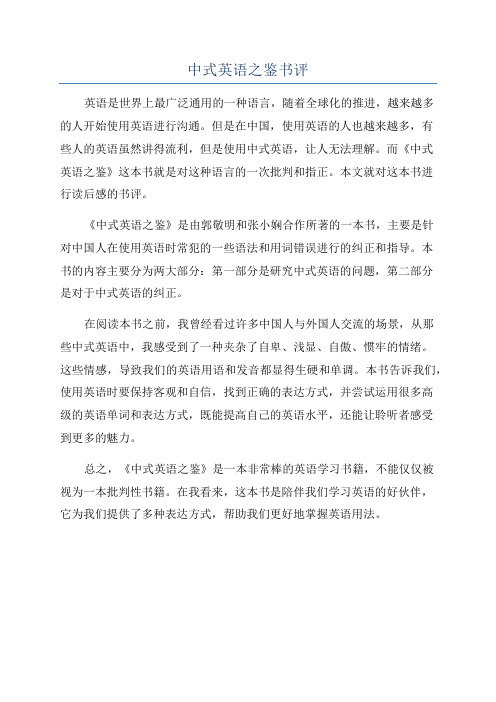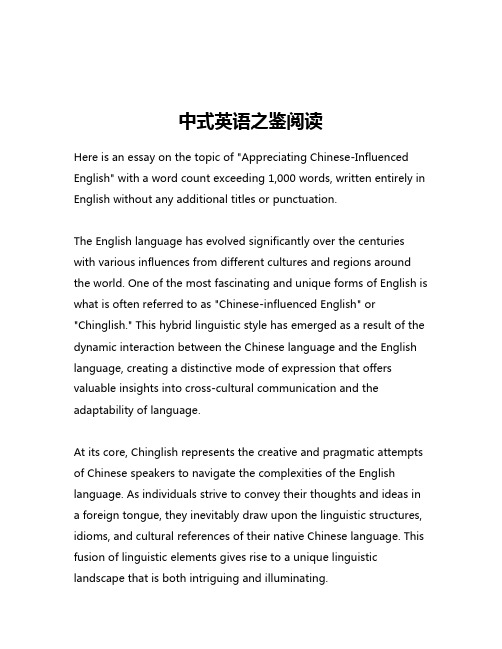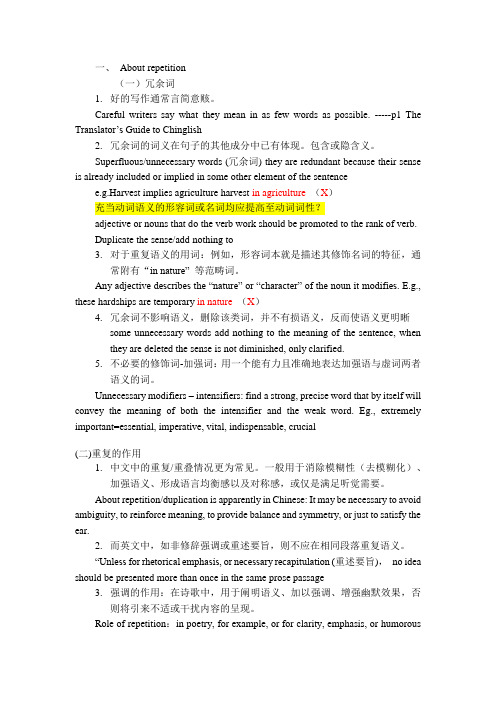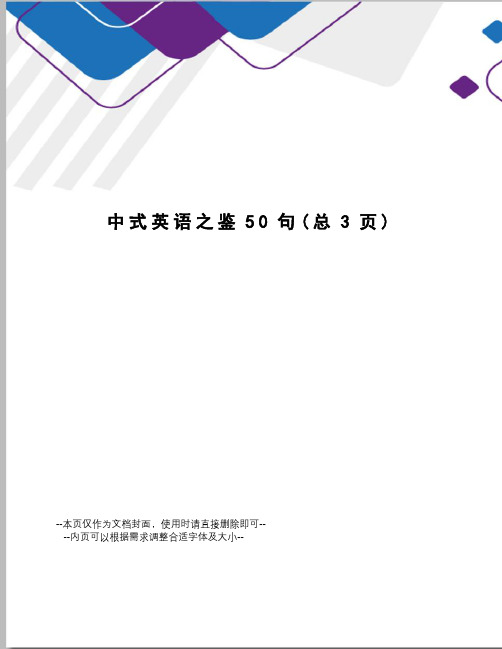中式英语之鉴
中式英语之鉴全译本

中式英语之鉴全译本中式英语是指中国人在使用英语时,受到母语中文的影响,造成语法、词汇和表达方式不符合英语的规范。
《中式英语之鉴》是一本书籍,旨在总结和纠正中式英语的常见错误和问题。
以下是对《中式英语之鉴》的全译本的多角度全面回答:《中式英语之鉴》全译本是一本详细介绍中式英语问题的书籍,它从多个角度对中式英语进行了全面的分析和解读。
该书的目的是帮助读者理解中式英语的特点和常见错误,并提供正确的英语表达方式。
首先,该书从语法角度深入探讨了中式英语的问题。
它指出了中式英语中常见的语法错误,比如错误的时态使用、冠词和代词的错误搭配等。
通过详细的解释和例子,读者可以更好地理解英语语法的规范,并避免中式英语中常见的错误。
其次,该书从词汇角度解析了中式英语的特点。
它列举了中式英语中常见的词汇错误,比如直译、误用和歧义等。
通过对这些错误的解释和纠正,读者可以学会正确地选择和使用英语词汇,避免中式英语中常见的词汇错误。
此外,该书还从语言习惯和表达方式的角度分析了中式英语的问题。
它指出了中式英语中常见的表达方式不符合英语的习惯和规范,比如过度使用被动语态、使用繁琐的句子结构等。
通过对这些问题的解释和示例,读者可以更好地掌握英语的表达方式,避免中式英语中常见的表达问题。
此外,该书还提供了一些实用的技巧和建议,帮助读者纠正中式英语的问题。
它介绍了一些常用的英语学习资源和方法,以及如何培养良好的英语思维方式和习惯。
通过这些技巧和建议,读者可以更好地提高自己的英语水平,避免中式英语的陷阱。
总之,《中式英语之鉴》全译本是一本全面深入地解析中式英语问题的书籍。
它从语法、词汇、表达方式和学习方法等多个角度进行了全面的分析和解读。
通过阅读该书,读者可以更好地理解和纠正中式英语的问题,提高自己的英语水平。
中式英语之鉴笔记

中式英语之鉴笔记以下是一份中式英语之鉴笔记:一、中式英语的表现1、用词不当:中式英语常常在用词上出现偏差,使用不地道的表达方式。
例如,“I am very happy to help you.”应该翻译为“我很高兴能帮助你。
”而不是“我非常开心可以帮助你。
”。
2、语法错误:中式英语在语法方面常常出现错误,比如使用动词的不当形式,或是在句子的结构上出现问题。
例如,“Yesterday I went to the park and I saw a beautiful sunset.”应该翻译为“昨天我去了公园,看到了美丽的日落。
”而不是“昨天我去了公园我看到了美丽的日落。
”。
3、表达方式生硬:中式英语的表达方式常常显得生硬,不够流畅自然。
例如,“I like this book. It is very interesting.”应该翻译为“我喜欢这本书,它很有趣。
”而不是“我喜欢这本书,它很有趣吗?”二、如何避免中式英语1、多读多听:多读英文原著和新闻报道,多听英语音频和视频,可以提高英语语感和表达能力。
2、学习语法:学习英语语法规则和句型结构,可以帮助你正确地使用英语。
3、写作练习:通过写作练习可以锻炼你的英语表达能力和思维能力。
4、请外教指导:请外教指导你的英语表达,指出你的问题所在,可以帮助你纠正中式英语的错误。
三、中式英语之鉴示例1、“I very like English.”(错误)正确翻译:“I like English very much.”(正确)2、“She is beautiful than me.”(错误)正确翻译:“She is more beautiful than me.”(正确)3、“I have two books in my hand.”(错误)正确翻译:“I have two books in my hands.”(正确)总之,要避免中式英语的出现,需要不断的学习和实践。
中式英语之鉴好词好句摘抄英文

中式英语之鉴好词好句摘抄英文01.有他这颗扫帚星,什么事情都办不成。
误:With a comet like him, nothing can be accomplished.正:With a jinx like him, nothing can be accomplished.02.萝卜青菜,各有所爱。
误:Some prefer radish but others prefer cabbage.正:Tastes differ.03.他一向嘴硬,从不认错。
误:He has always got a hard mouth and never admit a fault.正:He never says uncle.04.老师很喜欢这个嘴甜的小姑娘。
误:The teacher likes this sweet-mouthed little girl very much.正:The teacher likes this honey-lipped little girl very much.05.同学们都很讨厌他,因为他经常拍老师的马屁。
误:The student all dislike him because he often pats the teacher's ass.正:The students all dislike him because he often licks the teacher's boots.06.你听说了吗?迈克把他的女朋友给甩了。
误:Have you ever heard that Mike broke up with his girlfriend.正:Have you ever heard that Mike dumped his girlfriend.07.我们要把祖国建设成为社会主义的现代化强国。
误:We will build our motherland into a socialist modern powerful country.正:We will build our motherland into a modern powerful socialist country.08.人都是这山望着那山高,对自己的现状没有满意的时候。
中式英语之鉴书评

中式英语之鉴书评
英语是世界上最广泛通用的一种语言,随着全球化的推进,越来越多
的人开始使用英语进行沟通。
但是在中国,使用英语的人也越来越多,有
些人的英语虽然讲得流利,但是使用中式英语,让人无法理解。
而《中式
英语之鉴》这本书就是对这种语言的一次批判和指正。
本文就对这本书进
行读后感的书评。
《中式英语之鉴》是由郭敬明和张小娴合作所著的一本书,主要是针
对中国人在使用英语时常犯的一些语法和用词错误进行的纠正和指导。
本
书的内容主要分为两大部分:第一部分是研究中式英语的问题,第二部分
是对于中式英语的纠正。
在阅读本书之前,我曾经看过许多中国人与外国人交流的场景,从那
些中式英语中,我感受到了一种夹杂了自卑、浅显、自傲、惯牢的情绪。
这些情感,导致我们的英语用语和发音都显得生硬和单调。
本书告诉我们,使用英语时要保持客观和自信,找到正确的表达方式,并尝试运用很多高
级的英语单词和表达方式,既能提高自己的英语水平,还能让聆听者感受
到更多的魅力。
总之,《中式英语之鉴》是一本非常棒的英语学习书籍,不能仅仅被
视为一本批判性书籍。
在我看来,这本书是陪伴我们学习英语的好伙伴,
它为我们提供了多种表达方式,帮助我们更好地掌握英语用法。
中式英语之鉴阅读

中式英语之鉴阅读Here is an essay on the topic of "Appreciating Chinese-Influenced English" with a word count exceeding 1,000 words, written entirely in English without any additional titles or punctuation.The English language has evolved significantly over the centuries with various influences from different cultures and regions around the world. One of the most fascinating and unique forms of English is what is often referred to as "Chinese-influenced English" or "Chinglish." This hybrid linguistic style has emerged as a result of the dynamic interaction between the Chinese language and the English language, creating a distinctive mode of expression that offers valuable insights into cross-cultural communication and the adaptability of language.At its core, Chinglish represents the creative and pragmatic attempts of Chinese speakers to navigate the complexities of the English language. As individuals strive to convey their thoughts and ideas in a foreign tongue, they inevitably draw upon the linguistic structures, idioms, and cultural references of their native Chinese language. This fusion of linguistic elements gives rise to a unique linguistic landscape that is both intriguing and illuminating.One of the most prominent features of Chinglish is the direct translation of Chinese idioms and expressions into English. This process, known as "literal translation," often results in phrases that may seem nonsensical or humorous to native English speakers, but which carry profound meaning and cultural significance in the Chinese context. For instance, the Chinglish phrase "the old man under the tree" might be a direct translation of the Chinese idiom "树下老人," which refers to a wise and experienced individual who imparts valuable knowledge and guidance. Similarly, the expression "to add oil" in Chinglish is a literal translation of the Chinese phrase "加油," which is used to encourage and motivate others. These linguistic quirks not only highlight the differences between the two languages but also offer a glimpse into the unique worldviews and cultural perspectives of Chinese speakers.Moreover, Chinglish often reflects the influence of Chinese grammatical structures on the usage of English. Chinese is a language that is characterized by its conciseness and the omission of certain grammatical elements, such as articles and pronouns. When Chinese speakers translate these linguistic features directly into English, the result can be sentences that appear incomplete or unconventional to native English speakers. For example, the Chinglish phrase "I go to school" might be a direct translation of the Chinese sentence "我去上学," where the pronoun "I" and the article"the" are omitted. While this construction may seem unnatural in standard English, it reflects the underlying logic and linguistic patterns of the Chinese language.Interestingly, Chinglish also showcases the creative and adaptive nature of language. As Chinese speakers grapple with the challenges of expressing themselves in English, they often develop novel ways of using words and phrases that defy the conventional norms of the language. This linguistic creativity can be seen in the coining of new terms, the repurposing of existing words, and the blending of Chinese and English elements. For instance, the term "self-service" in Chinglish might be used to refer to a situation where an individual is expected to take care of their own needs, rather than relying on the assistance of others. This innovative usage of the term "self-service" reflects the practical and resourceful mindset of Chinese speakers as they navigate the linguistic landscape of English.Furthermore, Chinglish can be seen as a testament to the resilience and adaptability of the English language. As it encounters and assimilates influences from diverse cultural and linguistic backgrounds, English demonstrates its remarkable capacity to evolve and accommodate new forms of expression. The emergence of Chinglish not only enriches the global tapestry of English but also highlights the language's ability to serve as a medium for cross-cultural exchange and understanding.In the realm of business and international communication, Chinglish can play a crucial role in bridging cultural divides and facilitating effective dialogue. As Chinese companies and individuals engage with the global marketplace, their use of Chinglish can provide valuable insights into their thought processes, cultural references, and communication styles. By understanding and appreciating the nuances of Chinglish, native English speakers can cultivate a deeper appreciation for the cultural context and perspectives of their Chinese counterparts, ultimately leading to more productive and meaningful exchanges.Moreover, the study of Chinglish can offer valuable lessons in language learning and intercultural communication. By examining the patterns and mechanisms underlying Chinglish, linguists and educators can gain valuable insights into the challenges and strategies employed by language learners. This knowledge can inform the development of more effective language teaching methodologies and materials, helping to bridge the gap between the Chinese and English languages and fostering greater cross-cultural understanding.In conclusion, the phenomenon of Chinglish is a fascinating and multifaceted aspect of the English language. It represents the creative and adaptive efforts of Chinese speakers to navigate thelinguistic landscape of English, while also reflecting the rich cultural heritage and unique perspectives of the Chinese language. By appreciating and studying Chinglish, we can gain a deeper understanding of the dynamic interplay between language and culture, and the remarkable resilience and adaptability of the English language as it continues to evolve and embrace diverse influences from around the world.。
《中式英语之鉴》-笔记

一、About repetition(一)冗余词1.好的写作通常言简意赅。
Careful writers say what they mean in as few words as possible. -----p1 The Translator’s Guide to Chinglish2.冗余词的词义在句子的其他成分中已有体现。
包含或隐含义。
Superfluous/unnecessary words (冗余词) they are redundant because their sense is already included or implied in some other element of the sentencee.g.Harvest implies agriculture harvest in agriculture (X)充当动词语义的形容词或名词均应提高至动词词性?adjective or nouns that do the verb work should be promoted to the rank of verb.Duplicate the sense/add nothing to3.对于重复语义的用词:例如,形容词本就是描述其修饰名词的特征,通常附有“in nature” 等范畴词。
A ny adjective describes the “nature” or “character” of the noun it modifies. E.g., these hardships are temporary in nature(X)4.冗余词不影响语义,删除该类词,并不有损语义,反而使语义更明晰some unnecessary words add nothing to the meaning of the sentence, whenthey are deleted the sense is not diminished, only clarified.5.不必要的修饰词-加强词:用一个能有力且准确地表达加强语与虚词两者语义的词。
chinglish中式英语之鉴P166167

Central-South China.
Analysis:
1.the word “China’s” in “China’s iron and steel industry ” is not necessary because we can understand it through the whole sentence;
5) We should actively expend the scale of
using foreign funds and introducing advanced technology. Analysis: “expend the scale of using… and introducing…” = “use… and introduce…”. (Pattern: unnec. verb + unnec. noun + third word).
8) Seeing that we had scored remarkable achievements in the transformation of the old
society, some people began to show a varying
degree of negligence (n. 疏忽;忽视;粗心大意 )
sectarianism ([sek'tεəriənizəm]n. 宗派主义;教派意识) in
handling personnel, so that specially trained talents are assigned to the units that deserlysis: “to correct this practice” is only the unnec. verb + noun form of “to eliminate”;
中式英语之鉴50句

中式英语之鉴50句(总3页)--本页仅作为文档封面,使用时请直接删除即可----内页可以根据需求调整合适字体及大小--01.这个教授教得很烂。
[误] The professor teaches badly.[正] The professor is so terrible.02.北京申奥成功的消息令我们热血沸腾。
[误] Beijing's winning the bid for the Olympics makes our blood boil.[正] Beijing's winning the bid for the Olympics makes us excited.(make one's spine tingle)03.别听他们胡说八道,根本就没那回事。
[误] Don't listen to their babbling. Nothing of the sort.[正] Don't be fooled by their babbling. Nothing of the sort.04.我们这儿的人都觉得他有婚外恋。
[误] People around here all feel that he has affairs outside his own marriage.[正] People around here all feel that he is leading a double life.05.别看别人不把她当回事,在家里她可是父亲的掌上明珠。
[误] Although other people never take her serious, she is the pearl on her father's hand at home. [正] Although other people never take her serious, she is the apple of her father's eye at home.06.都十点钟了。
- 1、下载文档前请自行甄别文档内容的完整性,平台不提供额外的编辑、内容补充、找答案等附加服务。
- 2、"仅部分预览"的文档,不可在线预览部分如存在完整性等问题,可反馈申请退款(可完整预览的文档不适用该条件!)。
- 3、如文档侵犯您的权益,请联系客服反馈,我们会尽快为您处理(人工客服工作时间:9:00-18:30)。
丹尼斯自己不努力,还老是眼红别人的 成就。
[误] Denis himself doesn’t work hard, however, he is always red-eyed of other people’s achievements. [正] Denis himself doesn’t work hard, however, he is always green-eyed of other people’s achievements. 注:中国人说一个人嫉妒用“眼红”,但英美人则用 “眼绿”来形容。英语的 green 除了表示颜色之外还有 “嫉妒”的意思,又如:I was absolutely green when I saw his splendid new car(我看到他那辆漂亮的新 车非常眼红)。其实,英语中许多表示色彩的词汇都有 特殊的含义,不能照字面去理解。再比如:He gave me a black look(他恶狠狠地蹬了我一眼);She visits
中式英语之鉴
汉语是我们的母语。
[误] Chinese is our mother language .[正] Chinese is our mother tongue. 注:tongue 除了指“舌头”,还可以用来指 “语言,方言”,如 the Spanish tongue 并非指“西班牙舌头” ”,而是指“西班牙 语”。我们常说的有“语言天赋”,英语里 相应的表达是 the gift of tongues.
对不起,我把课本忘在家里了。
[误] Sorry, I forgot my textbook at home. [正] Sorry, I left my textbook at home. 注:原文中的“忘”是指“落在家里” 的意思,不能翻译成英文的 forget, 而应用表示“把„留在某地,丢下,
因为没有吃的,那个小男孩瘦得像猴子。
[误] That Somali boy is as thin as a monkey because of the lack of food. [正] That Somali boy is as thin as a shadow because of the lack of food. 注:同一事物,在不同的文化里可能引起不同的联想, 具有不同的内涵。所以,在一种语言中用这种事物作 比喻,而在另一种语言中很可能会有不同的表达。这 样的例子中英文还有很多,例如:as timid as a hare(胆小如鼠),as strong as a horse(力大如 牛),as poor as a church mouse(一贫如洗)等。
我爷爷是奔75的人了。
误] My grandpa is running for seventyfive. 正] My grandpa is getting on for seventy-five. 注:run for 有“竞赛,竞选”之意,如: run for Congress(竞选国会议员),run for the presidency(竞选总统)等。而 get on for 才表示“接近”,它通常用进 行时态,后面一般跟年龄或者时间,如: It’s getting on for midnight(快到半
Thank you !
夏天要多喝白开水。
[误] You water in [正] You water in
should drink more white boiled summer should drink more plain boiled summer.
注:“白开水”不是指“水的颜色是白色”, 而是指“水中没有添加其他的东西”。而 plain(简单的,平常的,朴素的) 正是指“没 掺杂其他东西的,单纯的”,所以能确切表达
我是一个中国人。
[误] I am a Chinese. 正] I am Chinese.
注:第一句译文是不地道的,正确的 说法应该去掉不定冠词,或者说 I am a Chinese man。同样,He is an English 也没有 He is English 或 He is an Englishman 好。
正如中国的一句俗话:“笨鸟先 飞”。
[误] As an old Chinese saying goes, “Stupid birds have to start flying early.” [正] As an old Chinese saying goes, ”Clumsy birds have to start flying early.” 注:“笨鸟先飞”常用来比喻那些能力差的人,因 为做事怕落后,所以就提前行动。这里的“笨”并 非 stupid(智力低下的,愚蠢的)的意思,而用 clumsy(笨拙的,不灵巧的)更恰当。
听到这个消息,没有一个人不感到兴奋。
[误] Having heard the news, nobody did not feel excited. 正] Having heard the news, everybody felt excited.
注:汉语中把主、谓语同时否定(双重否定)以表示肯 定,但这不符合英语习惯,所以 nobody„not 的结构 在英语中是不正确的。翻译这类句子时,可像上面正确 的译文那样,把主语和谓语都改成肯定形式;也可用 “there be + 否定的主语 + 否定形式的定语从句”来 表达,即:There was nobody who did not feel
你希望什么时候成家呢 ?
[误] When do you want to start a family? 正] When do you want to get married? 注:中文的“成家”是“结婚”的意思, 而英文 start a family 的含义却是“生 第一个孩子”,二者完全不是一回事。
宁做鸡头,不做凤尾。
[误] Better be the head of a cock than the tail of a phoenix. [正] Better be the head of a dog than the tail of a lion. 注:每种语言中都有许多约定俗成的表达, 没有什么道理好讲,但使用时则需遵照各自 的语言习惯。中文是“鸡头”和“凤尾”比, 而英语中却要用“狗头”和“狮尾”。
爸爸总爱发脾气。
[误] Dad always likes losing his temper [正] Dad is apt to lose his
注:like doing something 表示“喜欢 干某事”,一般用来说明某人的兴趣爱好; 而 be apt to do sth.则表示“常常发生 某种行为”或“容易发生某种变化”。根 据原文的意思显然应该用后者。
